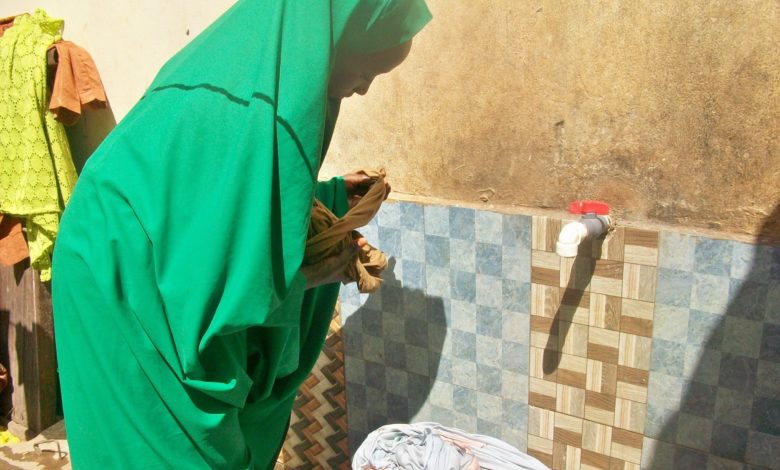Story Of 12-Year-Old Girl Turned ‘Parent’ By Mother’s Poor Health

Some people already know their fate at an early stage in life but fight to overcome the obstacles around them. Such is the case of Nabila Lawal, who despite glaring obstacles created by circumstances of her life, dreams of a bright future.
Nabila is a 12-year-old girl. She is the fourth child in a polygamous family of 15 children. She is a Junior Secondary School 1 student of Government Day Secondary School, Rafin Guza, Kaduna.
Being the first daughter of her mother’s, Nabila is usually saddled with the responsibilities of basic house chores. Her father works as a meat seller in the market and it is from his meagre sales that he supports his large family.
Before she was born, her mother was afflicted with prolonged labour-induced mental illness. For more than 12 years now, she is still battling with periodic attacks of the illness. Whenever she comes down with an attack which follows a monthly pattern, she cannot do any work.
It then falls upon Nabila to cook, wash, clean and take care of her three siblings. This work hinders her from going to school till her mother recovers which usually takes two to three weeks.
Usually, the family buys the mother’s medication from the psychiatry in order to minimise her attacks but lately due to the economic effects of COVID-19, the family has been unable to provide the medicines.
“My mother gets ill more often now due to the lack of money and once she’s sick she complains of severe headache, insomnia and she doesn’t talk.
“She also barks at outsiders sometimes. So, anytime she gets sick I don’t go to school because I have to do the house chores. If school resumes I will miss a lot of school work,” Nabila said.
Statistics show that a high percentage of women in Nigeria come down with postnatal mental illnesses such as postnatal post-traumatic stress disorder, postnatal anxiety and postnatal depression. The cause is due to generally poor obstetric practice, high rates of home delivery, sometimes by traditional birth attendants who use unsterilised tools which are associated with higher maternal mortality.
Nabila’s father hardly cares about the education of the children and does not provide basic stationery for them. Any child who is interested in school will have to get it from their mother or do menial jobs to get money for their education.
“My father doesn’t give us money for books, he always says he doesn’t have any. Right now my elder brother is done with secondary school since last year and wants to write the WAEC exams yet my father says he should forget about it because he doesn’t have money.
“Whenever we are asked to buy books or bring anything in school it is my mother that gives me the money. She does laundry for people in order to get paid, it is from this money she buys books for me.
“My three elder brothers also work in a mechanic’s workshop as apprentices, from the little money they get, they provide for themselves.
“Whenever my mother is sick she is unable to work and as such unable to get money, this affects my schooling also as I most times don’t have books to write,” Nabila said.
According to UNICEF statistics, Nigeria has 10.5 million out-of-school children, 60 per cent of these children are in Northern Nigeria and another 60 per cent are girls.
Most of the researches on the causes of girls dropping out of school include poor educational background of parents and the inability of parents to support children.
“It is obvious that with the rate at which my mother gets sick and the lack of financial support, I might have to drop out of school even though I like school very much and I wish to work in a company as a producer in the future,” Nabila said.
“Whenever my mum is sick, I usually get beaten and bullied by my elder brothers and step-mother. My step-mother always complains to them that I don’t help her do any work. Meanwhile, I sweep, wash the toilet, cook, bathe my siblings, wash their clothes and fetch water,” she said.
Nabila added, “every time she falls sick, I feel bad and I am not happy. It also saddens me how much I miss school.
“My only wish is for her to be cured permanently. I would like any intervention and support that will cure my mother so that she can work again and take care of us and also so that I can continue schooling normally.”
Support Our Journalism
There are millions of ordinary people affected by conflict in Africa whose stories are missing in the mainstream media. HumAngle is determined to tell those challenging and under-reported stories, hoping that the people impacted by these conflicts will find the safety and security they deserve.
To ensure that we continue to provide public service coverage, we have a small favour to ask you. We want you to be part of our journalistic endeavour by contributing a token to us.
Your donation will further promote a robust, free, and independent media.
Donate HereStay Closer To The Stories That Matter




